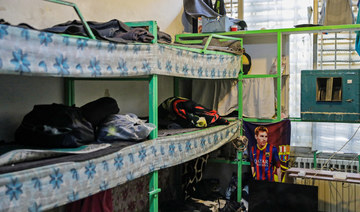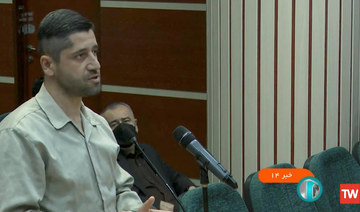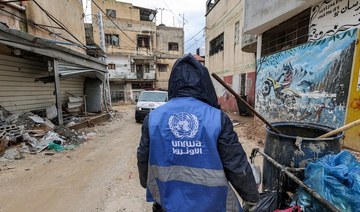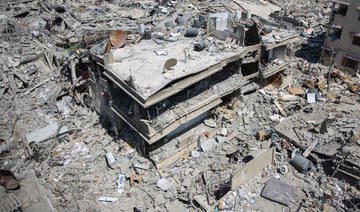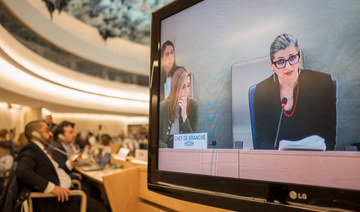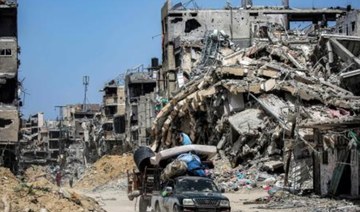BERLIN: Iran has released one Danish and two Austrian citizens, the European countries said Friday, thanking Oman and Belgium for their help in getting the trio freed.
Austrian Foreign Minister Alexander Schallenberg said he was “very relieved” that Kamran Ghaderi and Massud Mossaheb were being brought home after “years of arduous imprisonment in Iran.”
Denmark’s foreign minister, Lars Løkke Rasmussen, said that he was “happy and relieved that a Danish citizen is on his way home to his family in Denmark after imprisonment in Iran.” He didn’t name the person, saying their identity was “a personal matter” and he couldn’t go into details.
Schallenberg thanked the foreign ministers of Belgium and Oman for providing “valuable support,” without elaborating on what form it took. Løkke Rasmussen also thanked Belgium and said that “Oman played an important role.”
Last week, a prisoner exchange between Belgium and Iran returned to Tehran an Iranian diplomat convicted of attempting to bomb exiles in France, Assadollah Assadi. Belgian aid worker Olivier Vandecasteele, looking visibly gaunt, headed back to Brussels as part of the swap.
There was no immediate word on what, if anything, Iran obtained in return for the latest releases.
On Friday, Belgian Foreign Minister Hadja Lahbib tweeted that her country was “unwavering in our dedication to advocating for other Europeans who are being arbitrarily detained” and had “successfully secured the release of two Austrians and one Dane who were unjustly held in detention in Iran.”
Belgium’s prime minister, Alexander De Croo, said he had briefed his Austrian and Danish counterparts at a Thursday meeting in Moldova on the “imminent release” of the three prisoners “heading to Belgium via Oman.”
Iranian state media and officials did not immediately acknowledge a release on Friday, which is part of the weekend in the Islamic Republic.
Oman often serves an interlocutor between Iran and the West and brings released captives out of the Islamic Republic. An Oman Royal Air Force Gulfstream IV, which had been on the ground in Tehran for several days, took off shortly before news of the European trio’s releases came out. It landed later Friday in Oman’s capital, Muscat.
The releases also come after Oman’s Sultan Haitham bin Tariq visited Iran on his first trip there since becoming the Arab nation’s ruler in 2020.
Ghaderi is an Iranian-Austrian businessman who was arrested in 2016 and later sentenced to 10 years in prison for allegedly spying for the US, charges strongly rejected by his supporters. His family had criticized Austria for being silent on his case in recent years.
Mossaheb, also an Iranian-Austrian businessman, was arrested in 2019 and received a 10-year prison sentence after what Amnesty International called “a grossly unfair trial for vague national security offenses.” Amnesty had said Mossaheb suffered from heart failure and diabetes, making his imprisonment that much more dangerous for him.
Iran has detained a number of foreigners and dual nationals over the years, accusing them of espionage or other state security offenses and sentencing them following secretive trials in which rights groups say they have been denied due process.
Critics have repeatedly accused Iran of using such prisoners as bargaining chips with the West.
Schallenberg said his ministry would spare no effort to secure the release of a third Austrian national who remains in detention in Iran and whose case is currently on appeal.
Iran, facing Western sanctions over its rapidly advancing nuclear program, has experienced protests in recent months and economic strain. However, it also reached a detente with Saudi Arabia through Chinese mediation, and the International Atomic Energy Agency dropped two inquiries into the country’s nuclear program.
Iran releases 1 Danish, 2 Austrian citizens in operation involving Oman, Belgium
https://arab.news/jt39v
Iran releases 1 Danish, 2 Austrian citizens in operation involving Oman, Belgium
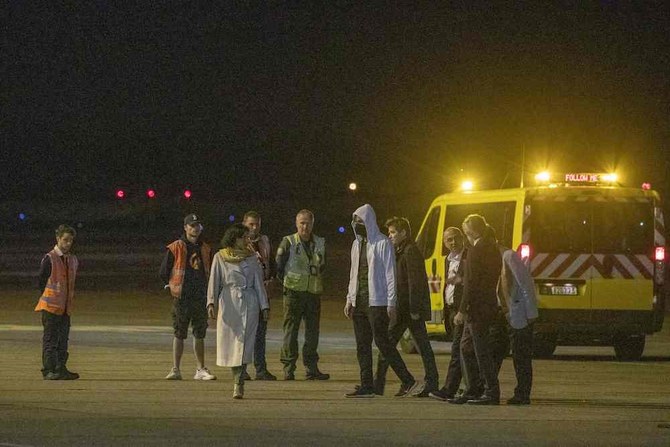
- Austrian Foreign Minister Alexander Schallenberg said he was “very relieved” that Kamran Ghaderi and Massud Mossaheb were being brought home
- Austrian Foreign Minister Alexander Schallenberg thanked the foreign ministers of Belgium and Oman for providing “valuable support”
Rafah evacuations not ‘possible’ under current conditions: Red Cross
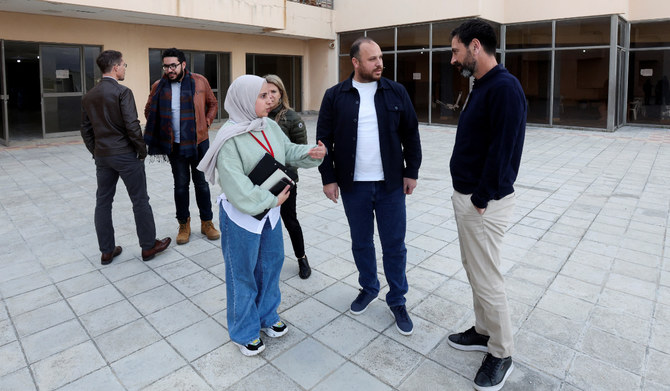
- Israel’s has killed at least 34,183 people in Gaza, mostly women and children, according to the Hamas-run territory’s health ministry
- Egeland said some Palestinians had returned to areas in northern Gaza in recent weeks but that more than one million remained in Rafah
DUBAI: Humanitarian workers have no knowledge of plans to evacuate Palestinians from Gaza’s southernmost city ahead of an expected Israeli assault, but such a transfer would not be “possible” under current conditions, a Red Cross official told AFP on Tuesday.
“The rumor is that the probability of a major operation in Rafah is increasing,” Fabrizio Carboni, Middle East regional director for the International Committee of the Red Cross (ICRC), said on the sidelines of an aid conference in the United Arab Emirates.
“When we see the level of destruction in the middle area (of Gaza) and in the north, it’s not clear to us where people will be moved to... where they can have decent shelter and essential services,” he added.
“So today, with the information we have and from where we stand, we don’t see this (massive evacuation) as possible.”
More than 1.5 million of Gaza’s population of 2.4 million had sheltered in Rafah, the last major population center in Gaza that Israeli ground troops have yet to enter, though thousands have been seen heading back north.
Israeli Prime Minister Benjamin Netanyahu has for two months talked of sending troops into Rafah to go after Hamas, the Palestinian militant group that runs Gaza.
On Sunday, he said the Israeli military would increase pressure to “deliver additional and painful blows” to the group behind the October 7 attack on Israel which triggered the ongoing war.
But Israel’s allies including Washington have warned against a Rafah operation, fearing a worsening of Gaza’s already catastrophic humanitarian conditions.
“We don’t see for the time being any plans for civilian evacuations,” Carboni said during the interview on Tuesday at the Dubai International Humanitarian Aid and Development Conference (DIHAD).
But “there is no condition for a military operation without devastating humanitarian consequences,” he added.
“Considering the level of destruction, considering that people are tired, some of them wounded and sick, and the limited access to food and essential services, I see (evacuations) as extremely challenging.”
The Israeli government said it was planning different evacuation scenarios, including the creation of tent cities that would be spared the fighting and would be set up with international support.
Citing Egyptian officials briefed on the Israeli plan, the Wall Street Journal reported that the evacuation operation would last two to three weeks and be carried out in coordination with the United States and Arab countries, including the UAE as well as Egypt.
But Carboni said an evacuation would be “difficult” to complete in that time frame.
Also speaking to AFP at DIHAD on Tuesday, the head of the Norwegian Refugee Council (NRC) said that “everybody seems to be on a countdown to war across the largest displacement camp on earth, which is Rafah.”
Describing a Rafah onslaught as an “apocalyptic situation,” Jan Egeland said aid workers operating inside Gaza have not been briefed on plans to mitigate civilian suffering during a Rafah offensive.
“There is no information, no consultation with the humanitarians, no advice, no hope,” he said.
Humanitarians in Gaza are “not hearing from the donors. They’re not hearing from the Western sponsors of Israel, and nothing from Israel itself,” Egeland said.
“What they hear is that Netanyahu says that he will attack but not plans for where should the civilians go, how can aid be provided or how can access be secured.
“We are completely in the dark on how to mitigate this countdown to a catastrophe.”
The little aid that is entering Gaza is being distributed in real time leaving no buffer stock that could be used in the event of a massive population movement, Egeland said.
“There is no stocks, there is no fuel and more importantly, there is no liquidity. There is no money, we cannot pay our staff salaries. We cannot pay those who deliver the services,” the NRC chief added.
Egeland said some Palestinians had returned to areas in northern Gaza in recent weeks but that more than one million remained in Rafah.
For those who have left “what awaits them in the north is ruins, complete ruins and unexploded ordinance and, in many cases, more bombardment,” he said.
“There is no safe place in Gaza if people leave Rafah.”
The Gaza war began with the unprecedented Hamas attack on Israel on October 7 that resulted in the deaths of 1,170 people, mostly civilians, according to an AFP tally of Israeli official figures.
Israel’s retaliatory offensive has killed at least 34,183 people in Gaza, mostly women and children, according to the Hamas-run territory’s health ministry.
Hamas armed wing Al-Qassam Brigades calls for escalation across all fronts
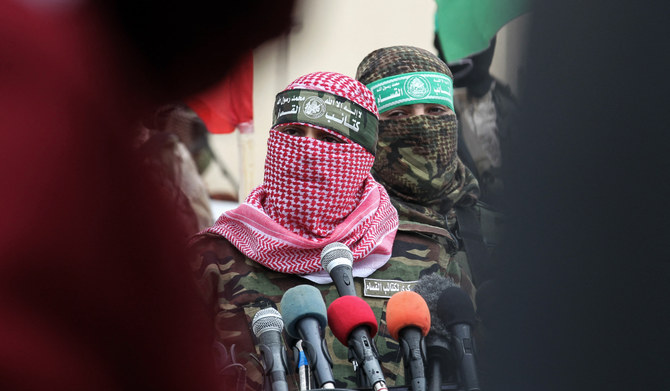
- Israel has killed more than 34,000 Palestinians, according to Gaza’s Health Ministry
DUBAI: The spokesperson for Hamas’ armed Al-Qassam Brigades, Abu Ubaida, called on Tuesday for an escalation across all fronts in a televised speech marking 200 days since the start of the Israel-Hamas war in the Gaza Strip on Oct. 7.
Israel says it is seeking to eradicate Hamas, which controls the enclave, in a war that has killed more than 34,000 Palestinians thus far. The war started when the militant group attacked Israel, killing 1,200 and taking 253 hostages, according to Israeli tallies.
In a video aired by Al Jazeera TV, Abu Ubaida praised Iran’s attack on Israel on April 13, saying the direct strikes with explosive drones and missiles “set new rules, drew important equations, and confused the enemy and those behind it.”
He also called for an escalation in the West Bank and Jordan calling it “one of the most important Arab fronts.”
Jordan, which lies between Iran and Israel, intercepted and shot down dozens of Iranian drones that entered its airspace and were heading to Israel, two regional security sources said on April 13.
“We call on the Jordanian people to step up their actions and raise their voices,” Abu Ubaida said.
He said Hamas was sticking to its demands at the ongoing ceasefire talks — that Israel ends its military offensive, pulls out forces from Gaza, allows the displaced to return to northern Gaza, and lifts the blockade.
“The government of the occupation is stalling in reaching a hostages-swap deal and is trying to obstruct efforts by the mediators to reach a ceasefire agreement,” Abu Ubaida said.
Qatar and Egypt have been trying to mediate a ceasefire, but Qatar foreign ministry’s spokesman said earlier on Tuesday all concerned parties should “show seriousness” in allowing such efforts to succeed.
‘We will leave no stone unturned to shield UNRWA from ferocious attacks,’ says agency chief
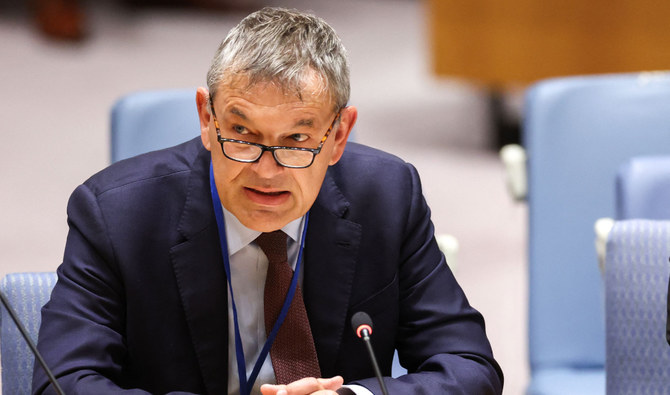
- Philippe Lazzarini says many supporters of each side in Israeli-Palestinian conflict fail to feel empathy for those on the other and so demonize them
- ‘The peace process, per se, is not enough; what we need is healing,’ he tells Arab News
NEW YORK CITY: The head of the UN agency that helps to provide aid and development for Palestinian refugees told Arab News on Tuesday that no effort will be spared to protect it from “ferocious attacks” by its critics.
And as protests related to the war in Gaza continue to cause friction around the world, including growing rows on US college campuses, Philippe Lazzarini, the commissioner general of the UN Relief and Works Agency for Palestine Refugees, said many of the supporters of each side in the conflict are unable to feel any empathy for those on the other, and so they demonize them.
“The peace process, per se, is not enough,” he added. “What we need is healing.”
Lazzarini said he has been struck by the fact that “empathy in this part of the world is most of the time unilateral. It’s either empathy only for the Palestinians, with no understanding where the Israelis are coming and the trauma that Oct. 7 has created in the country, or empathy only for Israelis, with absolutely no empathy for the Palestinians.”
He said his main message to US students is the need to show “compassion and empathy” for both peoples, “because ultimately, we expect that Israelis and Palestinians will live, and deserve to live, in peace and security.”
UNRWA has never been under attack to the extent it has been in recent months, Lazzarini said.
“It has never been in a situation where at same time 18 countries are reviewing or freezing their contributions,” he added. “It has never been the target of an open campaign for the total dismantlement of its activities in Gaza, and possibly beyond. What we are going through is quite unique in its ferocity.”
Agency staff and the communities they serve are “deeply anxious” about the possibility it might be weakened or even dismantled, he said, pointing to an opinion poll in which between 80 and 90 percent of Palestinians in Gaza and the West Bank expressed such fears.
“We will leave no stone unturned and we will bring the conversation where it needs to be to avoid the agency’s dismantlement,” said Lazzarini.
He added that this has been the mindset since the crisis the agency is facing was brought to the attention of the UN General Assembly in March, and was on display again last week during a meeting of the Security Council requested by Jordan in response to long-running attempts by Israeli authorities to force the agency out of Gaza.
“Now we are looking at the next, best avenue to shield the organization from these kind of attacks,” he added.
The agency, which provides aid and other services to millions of Palestinian refugees in Gaza and throughout the region, was thrown into crisis in January when Israel alleged that 12 UNRWA workers took part in the Oct. 7 attacks by Hamas against Israel.
In a report published on Monday, an independent team of investigators led by former French foreign minister Catherine Colonna, reported that Israeli authorities have yet to provide any evidence to back up their allegations, and had not previously expressed concerns about any individuals named on the lists of UNRWA staff they had been receiving since 2011.
In the immediate aftermath of the Israeli allegations, the US, the biggest single funder of the agency, and several other major donors immediately put their funding for the organization on hold. In all, 18 UN member states suspended or paused donations, while others imposed conditions, placing the very future of the agency in doubt. Many later resumed their donations.
Speaking to reporters at the end of an official visit to New York, Lazzarini once again said that he believes the attacks on UNRWA were not truly motivated by concerns about the neutrality of its staff, but rather the primary objective was to strip Palestinians of their refugee status.
Israel has long accused the agency of deliberately perpetuating the refugee status of millions of Palestinians, an allegation Lazzarini describes as “nonsense.”
“Basically, it is as if you would say that the humanitarian response in a conflict zone is perpetuating the conflict,” he said.
“The reality is that it is perpetuated because of the absence of a political solution. UNRWA was geared to be a temporary organization, hoping to end its activities the day there is a lasting and fair political solution. And here we are, 75 years later; it’s certainly not UNRWA perpetuating the status (but) our collective inability to promote a solution.
“If we have a genuine desire for a two-state solution, and we revitalize the implementation of such a solution, UNRWA’s temporary nature can be reinstated and hence UNRWA can pave the way for the future (Palestinian) state to provide the services the agency is providing.”
Since the beginning of the war in Gaza in October, 180 agency staff have been killed, more than 160 UN premises have been damaged or destroyed, and at least 400 people have been killed while seeking shelter under the flag of the UN.
Premises UNRWA staff were forced to abandon reportedly have been taken over and used for military purposes by the Israeli army, Hamas or other armed groups. Several agency workers have been arrested or mistreated, some have been tortured.
Lazzarini urged the Security Council to order an independent investigation into such incidents and for those responsible for the “blatant disregard” they have displayed toward UN premises, staff and operations in the Gaza Strip to be held accountable, so as to avoid setting “a new low standard in future conflict situations.”
The attacks on UNRWA and its work continue even as fears grow that warming weather will bring with it disease and other health risks. This is especially a concern in southern Gaza, which has become the last refuge for more than a million people forced by fighting to flee other parts of the territory, and where Lazzarini said “garbage collection has become a priority for our colleagues to prevent disease outbreak,” amid the “key anxiety” among people of a threatened, “possibly looming, upcoming military offensive” by Israel, “which seems to be back on the table.”
The report submitted by Colonna’s team after its investigation, which was ordered by the UN to assess whether UNRWA was doing all it could to ensure the neutrality of more than 32,000 workers, includes more than 50 recommendations, including improvements to internal oversight, enhanced in-person training, and additional support from donor nations.
Lazzarini welcomed the report and said he is committed to implementing its recommendations. It is clear from its findings, he said, that “the agency, in reality, has already a number of systems to deal with neutrality issues, far ahead of the average UN agencies or even (nongovernmental organizations), and because of the complexity of the environment we are operating in we need to be extremely vigilant, and we can always do more.”
He expressed his hope that as a result of the report and the measures that will be put in place, “the last group of donors will get the necessary confidence to come back” to the agency.
However, he noted that US will not provide any more donations until at least March 2025 because of a lack of political support for UNRWA in Washington, and added that “my task now is to try to bridge the gap” in financing that currently exists “and see that funding covered until the end of June.”
Fears grow for Rafah as Israel-Hamas war rages on 200th day
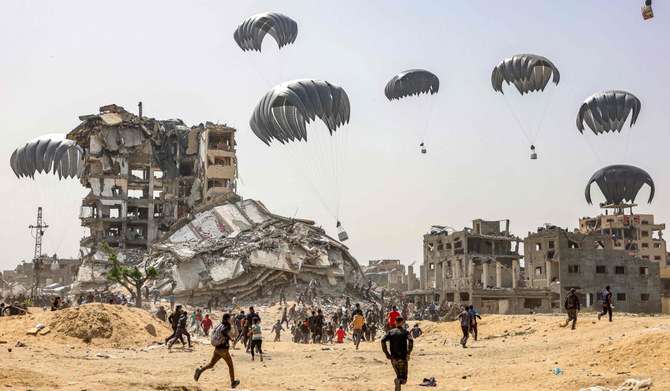
- Citing Egyptian officials briefed on the Israeli plans, the Wall Street Journal said Israel was planning to move civilians from Rafah to nearby Khan Yunis over a period of two to three weeks
- Israel has killed at least 34,183 Palestinians, most of them women and children, according to the health ministry in the Hamas-run territory
GAZA STRIP, Palestinian Territories: The Israel-Hamas war entered its 200th day on Tuesday as aid groups warned that Israeli plans to invade the southern city of Rafah where most Gazans have taken refuge would create an “apocalyptic situation.”
Fears have been rising that Israeli Prime Minister Benjamin Netanyahu will soon follow through on repeated threats to send troops into Rafah, where 1.5 million people have sought shelter, many in makeshift encampments.
“Everybody seems to be on a countdown to war across the largest displacement camp on Earth, which is Rafah,” Norwegian Refugee Council chief Jan Egeland told AFP.
Egeland warned that a ground assault on Rafah would be an “apocalyptic situation” and that humanitarian groups “are completely in the dark on how to mitigate this countdown to a catastrophe.”
Also on Tuesday, the United Nations rights office said it was “horrified” at reports of mass graves found at the Gaza Strip’s two biggest hospitals after Israeli sieges and raids.
Israel has repeatedly targeted Gazan medical facilities during the war, accusing Hamas of using them as command centers and to hold hostages abducted on October 7. Hamas denies the accusation.
Over the past three days, Gaza’s Civil Defense agency said nearly 340 bodies were uncovered of people killed and buried by Israeli forces at the Nasser Hospital in the southern city of Khan Yunis.
Israel’s army responded by saying that claims it had buried Palestinian bodies were “baseless and unfounded,” without directly addressing allegations that Israeli troops were behind the killings.
The army said that “corpses buried by Palestinians” had been examined by Israeli troops searching for hostages and then “returned to their place.”
UN rights chief Volker Turk called for an “independent” probe into the deaths at Nasser and Gaza City’s Al-Shifa hospitals, noting the “special protection” awarded to medical facilities under international law.
UN rights office spokeswoman Ravina Shamdasani said some of the bodies found at Nasser were allegedly “found with their hands tied and stripped of their clothes,” adding that efforts were underway to corroborate the reports.
AFP images from the scene showed numerous bodies under white shrouds in front of the bombed-out Nasser Hospital.
The White House said it would discuss the subject with Israel.
“Obviously scenes of mass graves in general are deeply concerning but I don’t have anything that can confirm the veracity of those,” US National Security Council spokesman John Kirby told reporters.
The Israeli army carried out intense shelling overnight of Gaza City, AFP correspondents and witnesses said.
Shelling and loud explosions were heard in southwest Gaza and Khan Yunis city, while strikes hit the Bureij and Nuseirat refugee camps in central Gaza.
The war began with an unprecedented Hamas attack on October 7 that resulted in the death of around 1,170 people, according to an AFP tally of Israeli official figures.
In retaliation, Israel launched a military offensive that has killed at least 34,183 people in Gaza, mostly women and children, according to the health ministry in the Hamas-run territory.
The Israeli army announced the death of a soldier in Gaza, raising its toll to 261 since the ground operation began.
Israel estimates that 129 of the roughly 250 people abducted during the Hamas attack remain in Gaza, including 34 who the military says are dead.
Public pressure has mounted on Netanyahu’s government to strike a truce deal that would secure the release of the remaining hostages.
Abu Obeida, spokesman for Hamas’s armed wing, said that “after 200 days, the enemy remains trapped in the sands of Gaza” and the hostages would “most likely” not return home soon.
At a rally near Netanyahu’s home in the coastal town of Caesarea, protesters including relatives of hostages set fire to a symbolic Passover table at the start of the week-long Jewish holiday on Monday.
Dalit Shtivi, whose son Idan was kidnapped on October 7, said she was struggling to cope without him during Passover, also known as the “holiday of freedom.”
“It’s so hard. I cannot explain the pain. I cannot... think of celebrating without him,” she said.
Outcry has been growing around the world against Israel’s offensive, which has turned vast areas of Gaza to rubble and sparked fears of famine.
Hundreds of students have been arrested in recent days at pro-Palestinian demonstrations on the campuses of prominent universities in the United States, Israel’s top ally and military supplier.
In Gaza, the United Nations says “multiple obstacles” continue to impede delivery of urgently needed aid for Gazans desperate for food, water, shelter and medicine.
But Netanyahu has vowed to press on with a planned offensive on Rafah, on the besieged territory’s border with Egypt.
Citing Egyptian officials briefed on the Israeli plans, the Wall Street Journal said Israel was planning to move civilians from Rafah to nearby Khan Yunis over a period of two to three weeks.
Satellite images shared by Maxar Technologies showed tent camps that had recently been set up in that area.
The Journal reported that Israel would then send troops into Rafah gradually, targeting areas where Hamas’s leaders are thought to be hiding, in a military operation that would last six weeks.
The European Union’s humanitarian chief Janez Lenarcic called on international donors to fund the United Nations agency UNRWA, which has been central to aid operations in Gaza.
His comment came after a much-awaited independent report found that “Israel has yet to provide supporting evidence” for its claim that UNRWA employs “terrorists.”
The report did find “neutrality-related issues,” such as agency staff sharing biased posts on social media.
After the report was released, UNRWA chief Philippe Lazzarini called for an investigation into the “blatant disregard” for UN operations in Gaza, adding that 180 of the agency’s staff have been killed since the war began.
While some countries have renewed funding for the agency, the US and Britain are among the hold-outs.
The White House would “have to see real progress” before it restores funding, Kirby said.
The Gaza war has triggered violence across the region, with deadly cross-border exchanges on Tuesday between the Israeli army and Lebanon’s Hezbollah, a Hamas ally.
The Iran-backed Lebanese group said it launched drones at northern Israeli army bases in retaliation for a strike deep into Lebanon that killed a Hezbollah fighter.
A woman and a girl were killed in an Israeli strike on southern Lebanon later on Tuesday, local rescuers and official media said.
Gaza doctors process 200 days of war from devastated hospital’s rubble
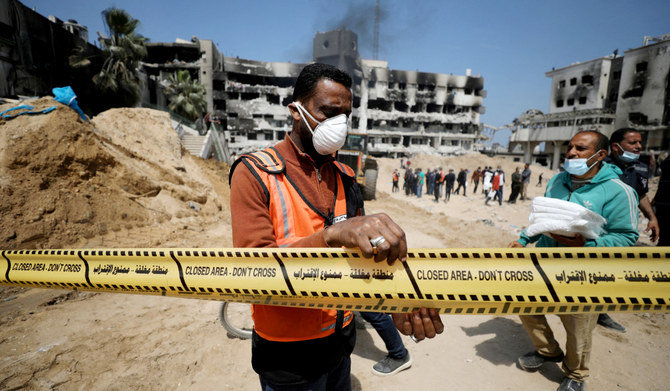
- UN Human Rights Chief Volker Turk said he was horrified by the hospital’s destruction and demanded an independent investigation
- Israel has killed 34,183 Palestinians in Gaza, mostly women and children, according to the health ministry in the Hamas-run territory
GAZA CITY, Palestinian Territories: Emergency doctor Amjad Alewah once saved lives at Al-Shifa hospital, the largest medical facility in the Gaza Strip.
But after 200 days of war between Israel and Hamas militants, he now stands in its ruins.
“We are now in the middle of the rubble of this great hospital,” Alewah, who returned to inspect the now charred emergency reception room, told AFP.
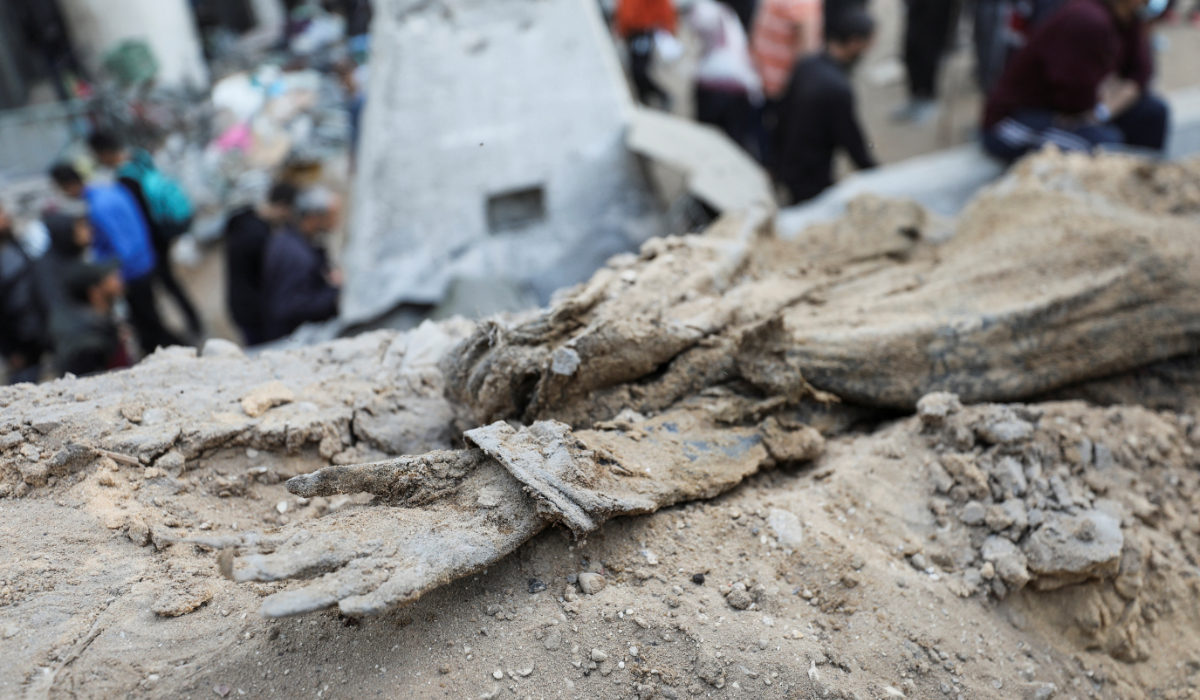
Following the outbreak of war, Al-Shifa became a safe haven for the thousands injured or fleeing the Israeli onslaught on the Palestinian territory.
“Every day, we received thousands of wounded,” he said, recalling having to work without enough medical equipment or fuel for electric generators.
“We had picked up the habit of spending all our time here, as if it was our main residence.”
But war came to Al-Shifa, with Israel launching multiple raids on the medical facility after accusing militants of operating a command center from tunnels below.

The Israeli military said two weeks of fierce fighting last month killed over 200 militants and recovered weapons.
Hamas, which rules Gaza, denies using the hospital for military purposes.
Footage of the complex filmed by AFP after two weeks of siege between March 18 and early April shows a site laid to waste.
UN Human Rights Chief Volker Turk said he was horrified by the hospital’s destruction and demanded an independent investigation.

“Hospitals are entitled to very special protection under international humanitarian law,” he said.
Alewah said he was saddened by the destruction of a “cornerstone of health for the whole north of the Gaza Strip,” calling on the international community and World Health Organization (WHO), which visited Al-Shifa to assess damages, to help rebuild.
“We’re lacking operating theaters to treat patients, particularly patients on dialysis or those with heart conditions.”
A rehabilitation medical committee has already been put in place, its head, Marwan Abu Saada told AFP, adding that they were working on building an emergency department in another part of the hospital complex.
“We will not lose hope,” he repeated, despite acknowledging the difficulty of the task at hand.
As many as 32 hospitals and 53 dispensaries are out of commission due to the war, according to the latest figures from the health ministry in Hamas-run Gaza, while 77,100 people are wounded across the territory.
“We want the war to end,” said Adham Qneita, a resident of Rimal, a neighborhood adjacent to the hospital.
Speaking in front of the devastation of flattened apartment buildings, he said he wished “only for death.”
“Nobody cares about us,” he told AFP.
The war between Israel and Hamas erupted when the group’s fighters launched an unprecedented attack on the country on October 7, resulting in the deaths of 1,170 people, mostly civilians, according to an AFP tally based on official Israeli figures.
Israel vowed to eliminate Hamas and its ensuing military offensive in Gaza has killed at least 34,183 people, most of them women and children, according to the Gaza health ministry.



